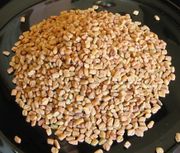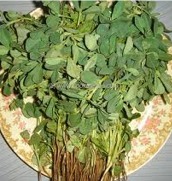Fenugreek


Fenugreek seeds Fenugreek Leaves
Culinary Uses:
The major use of fenugreek is in curry powders, figuring in many mixtures and the hot curries of Yarlpanam. When fish is curried, particularly strong-tasting fish such as tuna and mackerel, fenugreek is frequently included in the spice mixture. Also used as roasted in curries involving prawns and crabs in Jaffna.
In India, fenugreek seeds are mixed with yogurt and used as a conditioner for hair. It is one of the three ingredients of idli and thosai (Tamil). In Egypt, fenugreek seeds are prepared as tea, by boiling and then sweetened. This is a popular winter drink served in coffee shops
By itself, it has a somewhat bitter taste.
Medicinal uses:
Fenugreek is a digestive aid and reduces flatulence. As an emollient it is used in poultices for boils, cysts and other complaints. Supplements of fenugreek seeds were shown to lower serum cholesterol, triglyceride, and low-density lipoprotein in human patients. It is also said to reduce the sugar level of the blood and used in diabetes in conjunction with insulin. It also lowers blood pressure. Many other properties are ascribed to it in India and the East and not surprisingly include aphrodisiac. Usually washed, dried and stored and sometimes swallowed whole to relieve diarrhoea, flatulence and other digestive disorders. It is used in Ethiopia as a natural herbal medicine in the treatment of diabetes. Fenugreek seed is widely used as a milk producing agent by nursing mothers to increase inadequate breast milk supply. Studies have shown that fenugreek is a potent stimulator of breast milk production.




